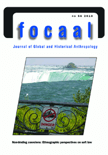
Focaal-Journal of Global and Historical Anthropology
Scope & Guideline
Democratizing Knowledge for a Global Audience
Introduction
Aims and Scopes
- Anthropology of Mobility and Migration:
The journal focuses on the anthropological implications of global mobility, migration patterns, and the socio-political contexts that shape these movements. It examines how individuals and communities navigate complex mobility rules and the impact of migration on identities and social relations. - Political Economy and Social Justice:
Focaal emphasizes the exploration of political economy, particularly how economic structures and policies affect marginalized communities. The journal critically analyzes the intersections of capitalism, state policies, and social movements, highlighting struggles for justice and equity. - Affect and Care:
The journal addresses the roles of affect, care, and emotional labor within various social contexts. It investigates how care practices shape social relations and political dynamics, particularly in times of crisis and precarity. - Historical Anthropology:
Focaal integrates historical perspectives into anthropological research, examining how historical processes influence contemporary social phenomena. This includes exploring the legacies of colonialism, socialism, and other historical frameworks in shaping current realities. - Environmental Anthropology and Resource Struggles:
The journal covers the anthropological study of environmental issues, focusing on resource management, ecological justice, and the socio-political conflicts arising from environmental degradation and climate change.
Trending and Emerging
- Precarity and Vulnerability:
Recent publications highlight the experiences of precarious populations, focusing on the socio-economic and political conditions that contribute to vulnerability. This theme is crucial in understanding the impacts of globalization and neoliberal policies on marginalized communities. - Mobilities and Migration Governance:
There is an increasing emphasis on the governance of migration and the rules surrounding mobility. This includes critical examinations of asylum systems, state regulations, and the lived experiences of migrants navigating these frameworks. - Affective Politics and Humanitarianism:
The exploration of affective politics, particularly in the context of humanitarian efforts, is emerging as a key theme. This includes analyzing the emotional dimensions of aid, care, and the politics of compassion in crisis situations. - Environmental Justice and Activism:
Focaal is increasingly addressing environmental issues through the lens of justice and activism. This trend reflects a growing concern for ecological sustainability and the social implications of environmental degradation. - Intersectionality in Social Movements:
Recent publications highlight the importance of intersectionality in understanding social movements. This includes analyzing how various identities (such as race, gender, and class) intersect to shape experiences of oppression and resistance.
Declining or Waning
- Traditional Ethnographic Studies:
There has been a noticeable decline in traditional ethnographic studies that focus solely on localized cultural practices without connecting them to broader global issues. The journal's recent publications suggest a shift towards more interdisciplinary approaches that integrate historical and political economic analyses. - Analysis of Postcolonial Theory:
Although postcolonial theory has been a significant area of interest, recent titles indicate a waning focus on this framework in favor of more dynamic and contemporary analyses of global power relations, migration, and precarity. - Static Cultural Representations:
The journal appears to be moving away from static representations of culture that do not account for change over time. Instead, there is a growing emphasis on dynamic processes and the fluidity of identities and social relations. - Local vs. Global Dichotomy:
There seems to be a diminishing emphasis on the dichotomy between local and global contexts. Recent publications indicate a preference for analyses that transcend these boundaries, focusing on interconnectedness and transnational networks.
Similar Journals

Annual Review of Anthropology
Advancing Knowledge in AnthropologyAnnual Review of Anthropology is a premier journal published by Annual Reviews, dedicated to providing comprehensive and authoritative reviews in the field of anthropology. Established with the goal of synthesizing essential research findings, this influential publication not only shapes contemporary anthropological discourse but also facilitates interdisciplinary dialogue within the broader realm of social sciences and cultural studies. With an impressive impact factor that places it in the Q1 category across multiple classifications, including Anthropology and Arts and Humanities, this journal is highly regarded by researchers and academics alike. The Annual Review of Anthropology has been a trusted resource for critical insights and transformative ideas, helping to advance the understanding of human societies from 1980 to the present. Although it does not offer open access, access to its articles is available through various academic institutions, ensuring that both seasoned scholars and students can benefit from its wealth of knowledge. With a Scopus ranking placing it in the top percentiles for relevant subjects, this journal is essential reading for anyone looking to stay at the forefront of anthropological research.
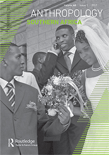
Anthropology Southern Africa
Exploring diverse cultural narratives through rigorous scholarship.Anthropology Southern Africa is a prestigious journal published by Routledge Journals, Taylor & Francis Ltd, and is dedicated to advancing the field of anthropology through rigorous scholarship and critical discourse. Established in 2013 and converging through 2024, this journal sets a high standard in its category, currently holding a Q2 classification in Anthropology and a Q1 ranking in Cultural Studies for the year 2023, ensuring its position as a significant contributor to social science research. With a robust Scopus ranking that places it in the 82nd percentile for Cultural Studies and the 67th percentile for Anthropology, Anthropology Southern Africa serves as an essential platform for researchers, professionals, and students engaged in anthropological inquiry and cultural analysis. Although it is not openly accessible, the publication prides itself on high-quality submissions that explore diverse cultural phenomena and anthropological perspectives, thereby inviting interdisciplinary engagement and fostering a global academic dialogue.
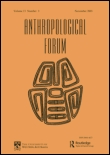
Anthropological Forum
Illuminating the Rich Tapestry of Human CulturesAnthropological Forum, an esteemed journal in the field of anthropology, is published by Routledge Journals, Taylor & Francis Ltd. With an ISSN of 0066-4677 and an E-ISSN of 1469-2902, the journal has cemented its reputation for fostering critical discussions and innovative research since its inception in 1963. Covering a broad range of topics within anthropology, it has achieved an impressive Q1 ranking in the category of Anthropology and a Q2 ranking in Arts and Humanities (miscellaneous) in 2023, showcasing its pivotal role in advancing scholarly discourse. With a Scopus ranking placing it in the top 10% of its field, the journal provides valuable insights into contemporary anthropological issues, making it an essential resource for researchers, professionals, and students alike. Although not an open-access journal, the comprehensive studies and articles published within its pages contribute significantly to the academic and professional community. Addressed out of Milton Park, Abingdon, UK, the Anthropological Forum remains a seminal platform for disseminating high-quality anthropological research.

CRITIQUE OF ANTHROPOLOGY
Fostering Rigorous Inquiry into Cultural PracticesCRITIQUE OF ANTHROPOLOGY, published by SAGE PUBLICATIONS LTD, stands as a vital platform in the field of anthropology, contributing significantly to the discourse surrounding cultural practices and societal norms since its inception in 1974. Recognized for its scholarly rigor, this esteemed journal holds a Q2 category ranking in both Anthropology and Arts and Humanities as of 2023, with impressive standings in Scopus, including a rank of 55 out of 502 in Social Sciences and 107 out of 552 in Arts and Humanities. The journal's extensive scope—from theoretical critiques to empirical studies—facilitates a rich exchange of ideas among researchers, professionals, and students, thereby enriching the anthropology community. Although CRITIQUE OF ANTHROPOLOGY does not provide open access, its prestigious reputation and impact on the field make it an essential resource for those seeking to deepen their understanding of anthropological scholarship.

Canadian Journal of History-Annales Canadiennes d Histoire
Advancing Scholarship in Canadian HistoriographyCanadian Journal of History - Annales Canadiennes d'Histoire is a prestigious scholarly publication that serves as a vital forum for research in the field of history, particularly as it pertains to Canadian narratives and experiences. Published by University of Toronto Press Inc, this journal has been at the forefront of Canadian historiography since its inception in 1979, continuing to disseminate knowledge through its rigorously peer-reviewed articles up to 2024. Although it operates under a traditional access model, its Q3 category ranking in History and presence in global academic databases reflect its ongoing commitment to quality scholarship, catering to historians, academics, and students alike. With an inclusive scope that encourages interdisciplinary collaboration, the journal provides a platform for diverse perspectives on Canadian history, thereby enhancing our understanding of the past and its significance in shaping contemporary society. For those engaged in the study of history, particularly in a Canadian context, the Canadian Journal of History is an indispensable resource.

Cuadernos de Antropologia
Championing Diverse Perspectives in AnthropologyCuadernos de Antropología is a premier academic journal published by the University of Costa Rica, Faculty of Social Sciences, that has been contributing to the field of anthropology since 1983. With its commitment to Open Access, this journal ensures that research findings are readily available to a global audience, fostering collaboration and knowledge dissemination across various regions and disciplines. Although specific metrics like H-index or Scopus Rankings are not provided, the journal's long-standing history and accessibility underscore its importance in promoting anthropological research in Latin America and beyond. Covering a broad spectrum of topics within anthropology, Cuadernos de Antropología welcomes submissions from researchers, professionals, and students, aiming to enrich the academic landscape with diverse perspectives and innovative insights. Located in the heart of Costa Rica, the journal serves as a vital platform for advancing the understanding of cultural, social, and historical contexts that shape human behavior.

Altre Modernita-Rivista di Studi Letterari e Culturali
Illuminating the Complexities of Cultural StudiesAltre Modernita-Rivista di Studi Letterari e Culturali, published by Milano University Press, serves as a significant platform in the fields of Cultural Studies, Linguistics, and Literature. Since its transition to Open Access in 2009, this journal has made strides in democratizing knowledge, ensuring that resources and research are accessible to a broader audience. With an ISSN of 2035-7680, it publishes innovative research and critical discourse aimed at fostering interdisciplinary dialogue within the humanities. Although currently positioned in Q4 and Q3 quartiles, Altre Modernita is steadily contributing to academic conversation, promoting literary analysis, cultural critique, and linguistic exploration. Located in Italy, it invites contributions from scholars worldwide, encouraging a diverse range of perspectives. Altre Modernita remains a valuable resource for researchers, professionals, and students dedicated to understanding the complexities of modern literature and cultural narratives.
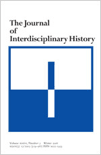
JOURNAL OF INTERDISCIPLINARY HISTORY
Connecting the Past with a Multidisciplinary LensThe JOURNAL OF INTERDISCIPLINARY HISTORY, published by MIT PRESS, serves as a pivotal platform for scholarly discourse at the intersection of history and various interdisciplinary fields. With a rich publication history dating back to 1970, the journal has continually provided a critical forum for exploring innovative historical methodologies and themes that resonate across diverse academic domains. Although it is not an Open Access journal, it remains invaluable for researchers dedicated to advancing the understanding of historical narratives and their implications within contemporary contexts. As reflected in its impressive Scopus ranks, the journal occupies a respectable position within its quartiles, holding Q3 in History and Q4 in History and Philosophy of Science. This suggests a growing recognition of its contributions among scholars in the field. Located in Cambridge, MA, USA, the journal is accessible to a global audience, fostering collaboration and dialogue among professionals, historians, and students alike. Whether you are a seasoned researcher or a budding student, the JOURNAL OF INTERDISCIPLINARY HISTORY stands as an essential resource for navigating the complexities of historical inquiry.

Anthropological Notebooks
Bridging Disciplines for a Deeper Understanding of HumanityAnthropological Notebooks, published by the SLOVENE ANTHROPOLOGICAL SOC, is a noteworthy journal within the field of anthropology. Established in Slovenia, this journal aims to provide a platform for scholarly dialogue and dissemination of anthropological research, fostering interdisciplinary approaches and global perspectives. Although it currently holds a Q4 quartile ranking in anthropology and ranks #421 out of 502 in Scopus, it serves as an essential conduit for emerging voices and innovative ideas in the discipline. Covering research published from 2010 to 2019 and from 2021 to 2024, the journal invites contributions that explore diverse cultural narratives and anthropological insights. Despite its limited open access options, Anthropological Notebooks remains a crucial resource for researchers, professionals, and students seeking to engage with contemporary anthropological discourse and enrich their understanding of human societies.
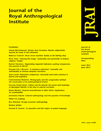
JOURNAL OF THE ROYAL ANTHROPOLOGICAL INSTITUTE
Navigating the Complexities of Human ExperienceJOURNAL OF THE ROYAL ANTHROPOLOGICAL INSTITUTE, published by Wiley, stands as a prestigious platform for scholarly discourse in the field of anthropology. With an ISSN of 1359-0987 and an E-ISSN of 1467-9655, this journal has been a vital resource for researchers, professionals, and students since its inception, featuring contributions that push the boundaries of understanding in both cultural and social anthropology. The journal’s rigorous peer-review process affirms its high academic standards, reflected in its top-tier Q1 rankings in both the Anthropology and Arts and Humanities categories for 2023. With a current ranking of #78 out of 502 in Social Sciences Anthropology and #138 out of 552 in Miscellaneous Arts and Humanities, it inhabits a critical space within academia, addressing seminal issues and innovative research. While the journal is not open access, it remains accessible to those affiliated with institutions that provide subscriptions, ensuring that groundbreaking anthropological insights are disseminated widely within the academic community. As it converges from 1995 to the present, the JOURNAL OF THE ROYAL ANTHROPOLOGICAL INSTITUTE continues to shape the landscape of anthropological research, engaging a diverse readership eager to explore the intricate tapestry of human cultures.